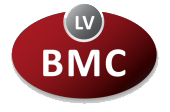
Project title: Function Determining Chromatin Self-Organization after Heregulin Stimulation of Gene Activities and Cancer Cell Differentiation
This project of the Baltic-German University Liaison Office is supported by the German Academic Exchange Service (DAAD) with funds from the Foreign Office of the Federal Republic Germany.
Duration of the project: 01.02.2022. – 31.10.2022.
The countries and institutions involved in the project:
Latvian Biomedical Research and Study Centre
Heidelberg University, Kirchhoff-Institute for Physics, Experimental Biophysics group
Aims of the project:
The cell nucleus, a complex system consisting of chromatin with flexibility, proteins and RNAs exists by self‐organization thermodynamic principles. Under limited nucleus volume for 2m-long DNA, the increase of complexity and entropy requires chromatin networks and cluster formations which have not been studied under this physical lens. A working hypothesis formulated by us in 2001 lies at the base of the current project. Such supra-chromosomal networks are mediated by retrotransposons ALU and LINE1 which control molecular trafficking and DNA accessibilityWe have shown in the 2001. article that the constitutive pericentromere-associated domains rearrange at certain time points after treatment of cancer cells with Heregulin, inducing differentiation; enabling a transcription avalanche starting of differentiation.
The re(organisation) of networks focusing in particular on retrotransposons during differentiation will be investigated in the breast cancer cell line MCF-7. Networks fluorescence labelled by antibodies or oligonucleotide-FISH will be subjected to confocal microscopy and single molecule localization microscopy. The topologic network dynamics will be analysed by quantitative image analysis and mathematics of point geometries (Ripley statistics. Transcription of transposons, c-FOS, nc-RNA will be correlated by qPCR to chromatin dynamics. At the symposium the obtained data and outlining hypothesis will be discussed with specialists, also useful for students.
Main activities:
- MCF-7 cell culturing, specimen preparation, antibody labelling, oligonucleotide FISH (Riga + Heidelberg)
- ncRNA transcription analysis, qPCR, molecular biology, fluorescence microscopy and image analysis (Riga)
- super-resolution single molecule localization microscopy, cluster analysis by Ripley distance frequency statistics, geometric analysis of pointillist pattern, topological analysis (Heidelberg)
- exchange visits (Riga + Heidelberg)
- joint publication
Public events:
“Self-Organization of Cells during Differentiation and under Cellular Stress Conditions“
Planned time: July 25, 2022.
Venue: Conference room, BMC, Riga
Speakers (preliminary): Dr. Jekaterina Erenpreisa, Riga; Prof. Dr. Michael Hausmann, Heidelberg; Dr. Alessando Giuliani, Rome; Dr. Talivaldis Freivalds, Riga; Dr. Reet Kurg, Tartu
Direct and indirect target group of the project:
Direct: Undergraduate and graduate students and group members supervised by Dr. Erenpreisa and Prof. Hausmann (~ 10 persons)
Indirect: Latvian students and scientists visiting the symposium (~ 20 persons); scientific community reading the publication of the project results (~ 10-20 citations).
International Symposium: “Spatial-temporal genome regulation in stress- response and cell-fate change
Symposium programme: Program and Book of Abstract

